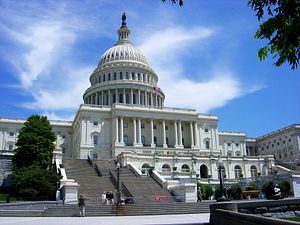Last week, five U.S. Republican senators wrote a letter urging Speaker of the House Nancy Pelosi to invite Taiwan President Tsai Ing-wen to speak in front of a joint session of Congress. But Tsai, whose office has referred to the United States as its most important foreign friend, has refused to say whether she would accept such an invitation.
The February 7 letter to Pelosi, from U.S. Senators Cory Gardner, Marco Rubio, John Cornyn, Tom Cotton and Ted Cruz, said the address would fit into plans to commemorate the upcoming 40th anniversary of the Taiwan Relations Act (TRA), which has served as a foundation for unofficial U.S.-Taiwan ties since the United States established diplomatic relations with the People’s Republic of China (PRC) in 1979. While Taiwan’s foreign ministry has enthusiastically prepared to honor the anniversary of the TRA, it has remained mum on a prospective invitation from Pelosi to Tsai.
Writing in The Diplomat, Gerrit van der Wees argued Pelosi should extend an invitation and cement its appreciation of Taiwan’s shift to democracy. Since 1979, Taiwan has emerged from decades of martial law and established itself as a rare haven of democratic values in East Asia – in stark contrast to the authoritarian rule of the PRC government across the Taiwan Strait.
However, the proposal was met with skepticism by others, including Taiwan-based commentator J. Michael Cole, who warned in the Taiwan Sentinel that such an invitation could backfire by creating division among members of Congress and sabotaging a longstanding bipartisan agreement to support Taiwan while keeping the country at arm’s length. Cole defended Tsai against criticism from the pro-independence cohort of her Democratic Progressive Party (DPP), who are demanding that she address Congress – and would also like her to propose a referendum on Taiwanese independence, a move that the Tsai administration has resisted.
Orville Schell, director of the Asia Society’s Center for U.S.-China Relations, also criticized the idea of inviting Tsai to speak to Congress while simultaneously urging the administration of U.S. President Donald Trump to find more creative ways to support Taiwan, such as supporting its capacity to develop asymmetric warfare capabilities.
Richard C. Bush, the former head of the American Institute in Taiwan (AIT) – which serves as the de facto U.S. embassy – said flatly that Pelosi should reject the senators’ proposal. Bush noted that, while Taiwan remains a valued friend of the United States, an address by Tsai would radically downgrade the already suffering U.S.-China relationship while also intensifying Beijing’s suppression of Taiwan, encouraging the PRC to pressure Taiwan’s 17 remaining diplomatic allies to switch ties to Beijing and escalate People’s Liberation Army military exercises directed toward Taiwan.
Bush also wrote of the letter: “I’m guessing here, but I suspect that the authors did not ask President Tsai if she thought this was a good idea – and, if they did ask, they didn’t listen very carefully to her answer.”
Indeed, the invitation has been met with silence by the Tsai administration, recently emboldened by its firm rejection of Chinese President Xi Jinping’s January 2 proposal of a “one country, two systems” model of governance unifying Beijing and Taipei. The aftermath of Xi’s speech garnered international words of support for Taiwan from global democracies in North America and Europe and gave Tsai, whose domestic popularity had dwindled since her 2016 election, a much-needed surge of momentum.
The DPP as a whole is seen as favoring eventual Taiwanese independence. While the Tsai administration is striving to strengthen its ties with the United States and other Asian countries alongside decreasing its economic enmeshment with China, it has been cautious not to disrupt the cross-strait status quo.
This strategy appears to correspond with the will of the people, who overwhelmingly oppose unification with the PRC but prefer to maintain the current state of affairs rather than pushing for official independence. Local Chinese-language media in Taiwan seen as supportive of the DPP, including the Liberty Times and Apple Daily, have also hesitated to lend editorial support to the idea of Tsai speaking in front of Congress.
The pitch by the group of senators, most notably Cruz (who spoke of the idea in front of the conservative American Enterprise Institute think tank), seems to serve most notably as a method of setting parameters for U.S.-Taiwan engagement in 2019 – a year that will see Tsai commence a hotly contested re-election campaign while the U.S. aims to deescalate its trade dispute with China.
Within Taiwan, Tsai’s potential opposition has oriented itself toward warmer ties with the United States. The Kuomintang (KMT), perceived as favoring eventual unification with China, announced its intention to establish an official presence in Washington, D.C. and consolidate support among congressional leaders and other D.C. policy influencers. Taipei mayor Ko Wen-je, an independent said to be mulling his own presidential run, plans to visit the United States in March amid criticism from the DPP that he favors irresponsibly warm ties with Beijing.
Overall, the senators’ letter has reaffirmed the functionality of the status quo while acting as a potential warning shot to Xi Jinping, who has continued to escalate his campaign to bring Beijing and Taipei closer to unification during his lifetime rule. Taiwanese leadership has signaled a preference, spanning across partisan lines, to maintain cooperation with the United States while not taking any drastic steps toward independence or unification with China – and, at present, the public appears to be on board.
In his recent article, J. Michael Cole argued that creating a situation where a leader of Taiwan can sensibly address U.S. Congress will take much more time – years, perhaps – of careful planning. Within the Tsai administration – despite its clear desire to remove itself from China’s sphere of influence – this philosophy of caution continues to reign supreme.

































